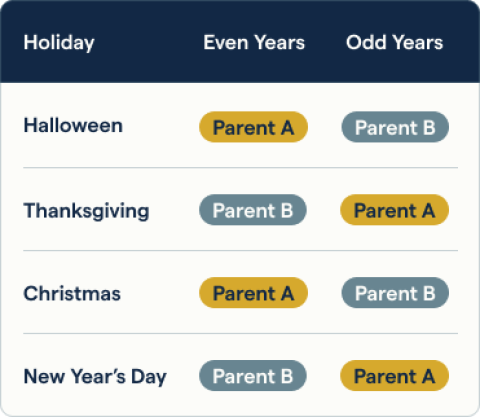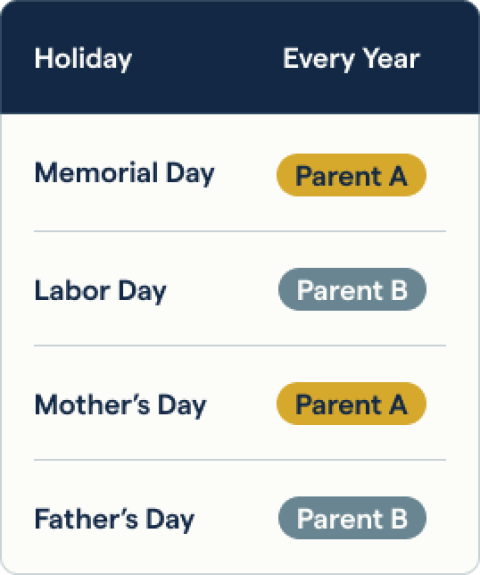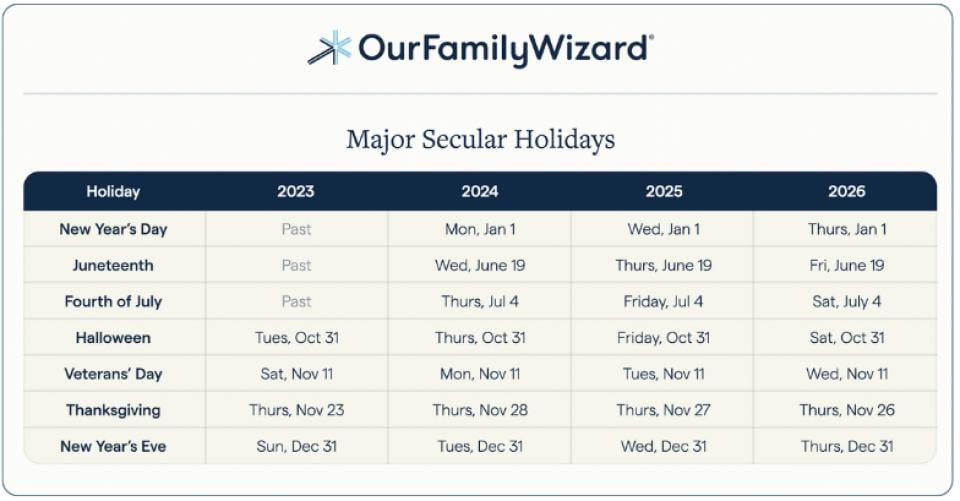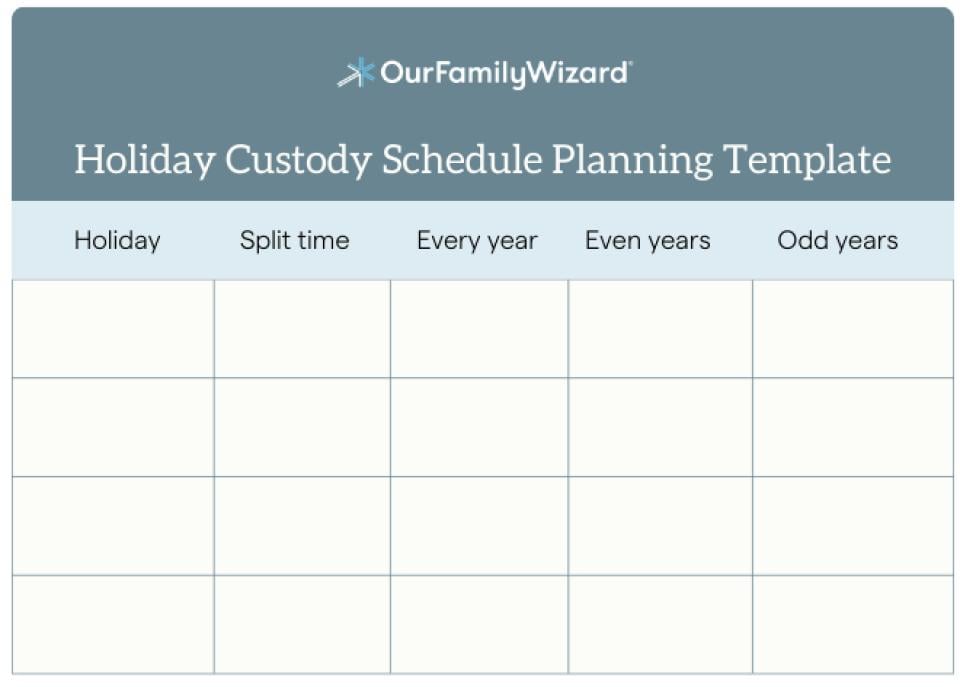Holiday Custody Schedules: Holiday Lists, Examples and Templates
Holidays should be about quality family time, not stress. Explore our guide for tips on simplifying holiday custody schedules and sharing parenting time. Use our free template to map out your holiday blueprint and celebrate new and old traditions with less stress.
What is a holiday custody schedule?
A holiday custody schedule outlines how children will spend holidays and special occasions. It specifies which co-parent the children will be with during these times. Holiday schedules usually override the typical parenting plan.
For most families, holidays are a cherished opportunity to come together, free from the demands of work and school. However, the holiday season can bring unique challenges for co-parents living separately. Balancing the desire to spend quality time with their children while minimizing logistical stress can be a delicate task for co-parents with joint custody.
"We always include holiday provisions in our custody orders so that co-parents know, well in advance, what their holiday schedule will be,” says Steve Epstein, a board-certified family law specialist from Raleigh, North Carolina. Epstein emphasizes the importance of incorporating holiday provisions into custody agreements.
their holiday schedule will be,” says Steve Epstein, a board-certified family law specialist from Raleigh, North Carolina. Epstein emphasizes the importance of incorporating holiday provisions into custody agreements.
"Every custody schedule we create specifically addresses major holidays like Christmas, Thanksgiving, Mother's Day, and Father's Day," Epstein continues. "Beyond these major holidays, it's up to the co-parents to decide whether they want to plan for additional holidays or just follow the standard parenting plan. Family law professionals accommodate a range of approaches that will suit different families.”
Typically, co-parents include holiday arrangements in their parenting plans or custody agreements. Legal experts universally encourage co-parents with split custody to establish these schedules well in advance. Erin Wilson, a family law attorney and someone that is frequently appointed as a Guardian ad Litem and Parenting Coordinator from Chicago, emphasizes this point: "Any responsible attorney will advise parents the importance of a concrete and specific holiday parenting time plan, even in the best of times and the thought that ‘we’ll always get along this well.’ What seems easy now may become complicated in the future. For example, new relationships or changing circumstances can make holiday schedules much less straightforward than co-parents initially anticipate."
experts universally encourage co-parents with split custody to establish these schedules well in advance. Erin Wilson, a family law attorney and someone that is frequently appointed as a Guardian ad Litem and Parenting Coordinator from Chicago, emphasizes this point: "Any responsible attorney will advise parents the importance of a concrete and specific holiday parenting time plan, even in the best of times and the thought that ‘we’ll always get along this well.’ What seems easy now may become complicated in the future. For example, new relationships or changing circumstances can make holiday schedules much less straightforward than co-parents initially anticipate."
Ultimately, co-parents must decide which holidays require specific custody schedules after a divorce or separation. Various factors influence how co-parents approach holiday planning. These include family traditions, religious holidays, the co-parents’ relationship, and where they live. Seeking guidance from co-parenting specialists or legal professionals can significantly streamline this process.
“Our job is to anticipate and plan for potential scenarios that co-parents may not have considered,” says family law attorney Ilene Glickman. “The more comprehensive the plan, the better. The objective is to ensure equitable holiday arrangements, allowing co-parents to focus on creating enjoyable holiday experiences with their children instead of arguing over schedules.”
considered,” says family law attorney Ilene Glickman. “The more comprehensive the plan, the better. The objective is to ensure equitable holiday arrangements, allowing co-parents to focus on creating enjoyable holiday experiences with their children instead of arguing over schedules.”
Key takeaways
- Holidays and special occasions require a separate custody schedule from the standard parenting plan.
- Holiday schedules take precedence over the regular parenting plan.
- Co-parents should proactively plan their holiday schedules when establishing custody orders.
- Typically, co-parents alternate holiday custody every year.
- Shared calendar apps help co-parents efficiently manage regular and holiday custody schedules.
Why should we have holiday custody schedules?
Holiday custody schedules are necessary to avoid misunderstandings over which parent will have the child on these special days. They take precedence over the usual custody arrangement and ensure a fair sharing plan. Also, they account for factors like travel, extended stays, and time with relatives.
Special occasions like holidays and vacations stand out because they disrupt our typical school and workweek routines. To ensure that everyone has the chance to spend time together, co-parents rely on tailor-made holiday schedules to accommodate the unique requirements of such occasions.
For example, holidays often involve travel or extended family gatherings, aspects not always covered by the standard parenting plan. As Epstein notes, "Holidays differ from the typical parenting plan since they typically involve travel and extended family, which the typical parenting plan might not accommodate."
Holiday custody schedules reduce misunderstandings and conflict during these important family times. With a pre-established plan, co-parents avoid last-minute surprises, disagreements on travel issues, or extended time apart. This clarity creates a more peaceful and enjoyable holiday atmosphere for parents and children.
"Holiday custody schedules not only help families maintain their cherished traditions but also provide opportunities for new traditions to develop,” says Wilson.

How do holiday schedules impact the typical parenting plan?
Holiday schedules replace the usual plan. Most custody plans and orders include a provision on holiday schedules. It’s important to understand the transition from the regular schedule to the holiday schedule and back again.
For example, if Parent A is scheduled to have the children during Christmas this year, even if it coincides with Parent B's usual co-parenting time, the holiday custody schedule will take priority, and the children will spend the time with Parent A. When the holiday time ends, the usual plan goes back into place.
In certain situations, holiday schedules can unintentionally result in one co-parent having an extended period with the children. For instance, if one parent already has a week with the kids and then has an additional week or even two for holiday custody, they could have custody for three consecutive weeks.
“There are two major ways to deal with a stacked co-parenting schedule,” says Glickman. “Either the co-parents can accept that it happens occasionally and assume it will all even out in the wash, or they can plan for it proactively by adding provisions to the custody order or parenting plan that address the issue.”
“As a result of allocated holidays or school vacations, parents may end up with three weekends in a row,” says Wilson. “Parents can agree in their Plan to either accept this as something that may occur or work out terms that provide for flips of time.”
How far in advance should we plan holiday custody schedules?
Plan holiday custody schedules as soon as reasonably possible to avoid conflict. This planning often happens during negotiations of the parenting plan after a divorce. Having plans in place early allows everyone to move forward with clarity.
"Planning as far as possible is the best way to navigate holiday custody schedules,” says Epstein. “Attorneys typically include holiday provisions in custody orders and parenting plans, ensuring a clear starting point for separated co-parents. Of course, if both co-parents agree, schedule adjustments can be made to accommodate changing circumstances or family dynamics.”
Ways to divide holiday time between co-parents
Co-parents typically alternate holiday time annually, allowing each to have it every other year. Some opt for a shared day, dividing it equally. Occasionally, one co-parent consistently takes a holiday more significant to them.
Here's a summary of the most common ways co-parents split their parenting time.
- Alternate holidays (even and odd years): Alternating the holiday every year is the most common approach. One parent celebrates the holiday in even years, and the other in odd years.
“Alternating holidays every year is a very common, straightforward approach that gives each co-parent an equal share of the holidays,” Epstein says.
When co-parents alternate the holidays, they try to ensure that both parents have at least one major holiday per year.
“When we alternate holidays every year, we try to create a fair shakeup of the fall and winter holidays,” says Glickman. “For example, we aim to ensure that each co-parent consistently has one 'significant' holiday. For instance, if one parent has Thanksgiving in even years, the other will have Christmas in even years.”
The schedule would also specify specific times, such as from 3 p.m. the day before to 3 p.m. the day after or whatever else was worked out.
- Split holiday in half: Co-parents divide the holiday equally, often with a precise schedule for sharing time throughout the day. For example, the children might have breakfast with one co-parent and dinner with the other on Thanksgiving. Then, they flip that schedule next year.
“It’s rare that co-parents will split a holiday during the day itself because the schedule can be logistically challenging for the children and co-parents,” Wilson says. “However, some co-parents who live near one another do manage to pull it off.”
Wilson continues: “For example, parents that live near one another often want to split up Halloween, as both co-parents want to spend time trick-or-treating with their child. In this case, they might schedule ‘shifts’ on Halloween night itself.” However, Wilson cautions that the parents should consider the children’s needs, rather than their desires, before splitting a holiday day.
- Fixed holidays: Sometimes, it makes sense for one co-parent to always spend a particular holiday with their children. This arrangement is typical when one co-parent values the holiday much more than the other. For instance, if one co-parent observes Judaism while the other does not, assigning the responsibility for Jewish holidays to the practicing co-parent is reasonable.
Also, some co-parents opt to give the non-custodial co-parent all or most of the Monday school holidays, particularly if the non-custodial co-parent only has weekends. That way, the non-custodial co-parent can spend more time with the children than normal.
- Divide holidays based on regular visitation: This approach maintains the regular visitation schedules, giving each co-parent whatever holiday corresponds with their typical parenting plan. This approach can work for any parenting schedule, like 50/50, 60/40, 70/30, and 80/20 splits. Co-parenting experts and family law attorneys don’t recommend this approach because it can lead to an unbalanced share of time and cause conflict later.
What holidays should be included in child custody schedules?
A well-rounded parenting plan should cover big holidays like Christmas and Thanksgiving and special days like the child's birthday. Some experts say to include all holidays, while others recommend letting co-parents pick which ones matter most to them.
Here’s a list of major holidays and events that co-parents may want to consider.
- Major secular holidays
- Halloween
- New Year’s Eve and New Year’s Day
- Thanksgiving
- Independence Day
- Veterans’ Day
- Juneteenth
- Special days
- Child’s birthday
- Parents’ birthdays
- Mother’s Day
- Father’s Day
- School holidays
- Spring break
- Winter break
- Staff days
- Summer break: Summer break is a special time of year for co-parents and children alike. Many co-parents opt to change their parenting schedule during the summer, particularly if they don’t use a 50/50 schedule.
- “Monday” holidays
- Martin Luther King Jr. Day
- Presidents’ Day
- Memorial Day
- Labor Day
- Religious holidays
- Christian holidays
- Christmas Eve and Christmas Day
- Good Friday
- Easter Sunday
- Jewish holidays
- Rosh Hashana
- Yom Kippur
- Chanukah
- Passover
- Sukkot
- Purim
- Muslim holidays
- Eid al-Fatir
- Eid al-Adha
- Hindu holidays
- Diwali
- Holi
- Christian holidays
Planning your holiday parenting schedule
To plan your holiday co-parenting schedule, use our cheat sheet that lists the dates of all major holidays through 2026. Then, collaborate with your co-parent to fill out the holiday custody schedule planning template.
Holiday custody schedule template
Use our holiday custody schedule template to map out how you want to split the holidays with your co-parent. Our customizable template includes all major holidays and space for you to include important dates like your child’s birthday and school holidays.
Co-parenting holiday custody scheduling tips
Family law experts stress the significance of early holiday schedule planning and proactive conflict resolution. Also, experts encourage co-parents to negotiate with the child’s best interest in mind.
Here are holiday scheduling tips straight from family law and parenting experts.
- Be proactive
Experts agree that co-parents will benefit tremendously if they map out their holiday schedule well ahead of time. “Co-parents that want the best possible outcome will typically address the holidays when they are sitting down and drafting the custody order,” notes Epstein.
Wilson echoes this sentiment. “Build the plan well ahead of time to cover all your bases. Allocate the holidays, be child-centric, and pick the times and holidays that work best for everyone, trying to be consistent with the start and ending times of the regular parenting schedule whenever you can.
Glickman agrees: “The more detail, the better. When co-parents know what to expect, they can focus on planning a nice holiday instead of stressing over schedules.”
- Always put children first
“I always try to remind parents that what’s good for the goose is good for the gander,” says Epstein. “When you consider your children's needs, you benefit as well.”
Every co-parent wants to ensure their children form cherished holiday memories. However, it can be easy to be pulled into a competition over time with the other co-parent, which can overshadow what’s best for the child.
“If your child is old enough, definitely get their input on how they want to spend the holidays,” says Wilson. “Also, be realistic. Your 16-year-old doesn’t want to spend Halloween with either co-parent—they want to be with their friends. Make sure you build some flexibility into your plans and always check in with your children as they grow older. Above all, be child-centric, not parent-centric.”
- Be flexible and willing to compromise
Flexibility is key when navigating holiday conflicts. Be open to adjusting plans when necessary and willing to compromise to ensure the best interests of your children.
Epstein points out that there are situations when relinquishing parenting time serves the child’s best interest. “If an extended family members come into town for a few days, most co-parents would willingly seize the opportunity for their child to spend quality time with them, even if it means giving up a day or two of parenting time.”
- Consider old family traditions and accommodate new ones
“When planning holiday schedules, it can be important for one parent to consider developing a new family tradition if the co-parents cannot satisfactorily share in the current family traditions rather than continuing to argue over the schedule,” adds Glickman. “For example, if Thanksgiving has always been spent out of town with one co-parent’s family, maybe the other co-parent can consider celebrating Thanksgiving the Sunday before so the children can continue to spend Thanksgiving with part of their extended family.”
“In many families, the Christmas tradition involves waking up and opening presents together," Glickman continues. "However, in the case of two separated co-parents, it's possible that someone may feel like they're missing out. Here, forming new traditions, like celebrating Christmas on another day with the second co-parent, might help everyone remain engaged and included.”
Co-parents should plan for the possibility of forming new relationships with people who may or may not have children. Creating joyful and positive holiday memories for everyone in a blended family can be challenging but achievable with proper planning.
- Prioritize which holidays match best for you
Everyone has their own unique approach to holidays and other celebrations. For example, you may like Labor Day, while your co-parent views it as just another three-day weekend.
"Before you negotiate with your co-parent, it’s important to identify which holidays are very important to you and which might matter less,” emphasizes Glickman. “Since compromise is inevitable in any scheduling process, establishing your priorities and boundaries from the outset lays the groundwork for a successful plan."
- Address holiday conflicts ahead of time
Keep an eye out for holidays that conflict so you can prepare. This issue can be particularly contentious for religious holidays. If co-parents follow different faiths, it’s important to map out which holidays might conflict and plan for handling these conflicts.
"Passover, Easter, and spring break frequently coincide," points out Wilson. "If this could pose a problem, it's crucial to proactively devise a plan and incorporate it into your parenting arrangement.”
- Use a shared calendar app to create your holiday blueprint and manage your schedule
Once you and your co-parent have identified what holidays to include in your schedule, start planning how to share them. This step often means thinking a few years ahead, as many co-parents trade off having their children on certain holidays year by year. After you and your co-parent have agreed to a holiday schedule, document it immediately on a shared calendar.
Experts agree that a shared calendar app represents the most effective approach to managing any parenting schedule, including holiday arrangements. These apps enable co-parents to synchronize schedules, reducing miscommunication and improving the co-parenting experience.
“Co-parents that invest in a shared calendar usually find that it significantly improves their communication and reduces stress and conflict,” adds Glickman.

Easiest way to create and track holiday custody schedules
Managing holiday schedules is easy with OurFamilyWizard. The platform offers a purpose-built holiday planner tool that integrates holiday plans with your standard parenting schedule, ensuring you can make the most out of holiday moments with your children.
OurFamilyWizard’s shared calendar tool is custom-built to support the co-parenting experience. Both co-parents can see their child’s schedule at a glance, and because they use the same shared calendar, there’s less room for miscommunication—everyone is on the same page.
OurFamilyWizard’s custom holiday planner tool simplifies coordinating child custody during holidays. Add the holiday to the schedule, and the app will assign the holiday schedule on top of the normal parenting plan. That way, co-parents can visualize how the plans change and, if needed, communicate about potential changes directly through the app.
Holiday custody schedule FAQs
Holiday custody schedules may seem complex, but they don't need to be. Discover answers to common questions, such as considering a child's age in schedule planning and handling conflicting holiday dates.
How does a child’s age affect custody schedules?
A child's age influences the amount of time they should spend with each co-parent to nurture meaningful relationships. Younger children often require frequent contact, while older ones can manage longer intervals apart.
Can we modify the holiday custody schedule based on the child’s age or changing circumstances?
You can always adjust your holiday schedule if both co-parents agree. If an agreement can't be reached, you may need legal counsel to help negotiate the change.
What happens if parents disagree on the holiday schedules?
If co-parents can't agree on a holiday schedule, they might need help from a mediator or a family lawyer to draft a plan that works for both of them.
How often can parents revise holiday custody schedules?
Co-parents can adjust the schedule as often as they both approve of the changes. However, if one co-parent makes changes without an agreement, it could lead to legal negotiations.
What if one parent wants to take the child on vacation during a holiday?
In most cases, the co-parent can spend the time with the child as they want, so long as it’s their custody under the holiday custody schedule. If a parent intends to take the child on vacation during the other co-parent's holiday, they must discuss it with the other co-parent.
It is important that parents refer to their parenting agreement or court order to know if there are requirements that must be met before traveling such as a timeline by which they must notify the other parent or if there are restrictions on where they can travel with their child.
What if one parent has religious or cultural traditions that conflict with the other parent’s traditions?
When co-parents plan holiday schedules for the future, they can spot and resolve conflicts tied to differing religious or cultural traditions. This ensures the child gets to celebrate key holidays with both parents.
How can we make sure the schedule is fair to both parents and their child?
To make sure the schedule works for both parents and the child, always think about what's best for the child. If your child is old enough, you can ask them for input. Then, with the help of a mediator, you and the other co-parent can split time equitably.
Can we create a custom holiday schedule that differs from the regular custody agreement?
Experts advise co-parents to create a custom holiday schedule that differs from the regular parenting schedule. Holiday schedules account for the unique aspects of holidays, like travel and time off school and work. They ensure that both co-parents spend the holidays with their children.
A Note on Terminology
In general, the term “custody schedule” refers to which parent the child lives with over a specific schedule. Today, many experts use other terms to describe this type of arrangement, like “parenting schedule” or “parenting time arrangement.” These new terms better represent a relationship and the parent’s responsibilities for their children. But just a heads up: this article uses these older and newer terms interchangeably.






